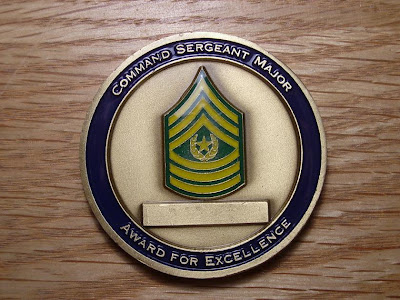A coin in the army is given when you impress someone, do something special, or work really hard and deserve some kind of recognition. It's usually given in lieu of an actual award. The coin is nice, mainly because it doesn't require any paperwork. It isn't worth any promotion points, though, and you can't wear it on your dress uniform.
Anyway, to date, in Iraq, I have recieved two coins. The first one is more of a generic coin, from the Sergeant Major of a humanitarian aid group representing a civil affairs brigade out of Norristown, PA. We have done a lot of work moving her cargo around the country, making sure people have their whelchairs, and kids have their school supplies. It's a nice coin.




Now, no one is exactly too sure of where these coins originally came from. There are two stories from the hallows of antiquity that may shed some light on the matter. On comes from Vietnam, and the other, my personal favorite, comes from World War One.
I'll begin with the Vietnam one. Back when the Army was a lot cooler, and they actually let you drink and such, the men would carry a single bullet in their hip pocket, mainly to deny the enemy the possibility of capture. (Now, by the way, we have to allow the enemy to capture us, it's all because of the Code of Conduct- there's too many rules these days.) At the bars, the front line fighters would occasionaly produce their bullets and "challenge" anothe to produce his. If he did, then the others would pay his tab that night. If not, then he would be responsible for his buddies' tab for the night. At any rate, these guys kept trying to trump each others' bullets, eventually getting so egregious that some were producing 105mm artillery shells, rockets, mortars and the likes. It was said that on a busy night at the local hooch bar, one could see the entire range of land-based munitions used in the southeast Asian theatre. Needless to say, someone decided that coins would be much safer than a bunch of live rounds, so they switched them up.
The other story, which is a bit more harrowing, is about a young fighter pilot in WWI. Many young, wealthy men from such esteemed places as Yale and Harvard quit their schooling halfway through the year and joined the new air corps. Back then, it was called the Aviation Section, US Signal Corps, the Division of Military Aeronautics, or the US Army Air Service, depending on when in the war one is speaking of. Anyway, one of these young lieutenants had medallions cast in solid bronze for his entire squadron. Another enterprising young lieutentant decided to wear his aroun dhis neck in a leather pouch. Shortly thereafter, he was shot down and captured by the Germans. They took all of his identification, save the pouch around his neck.
A short time later, the town he was being held in was bombed, and it gave him the opportunity to escape. He donned civilian clothes and went on his way. He was later apprehended by the French, who assumed that anyone with an American accent, not in uniform, and that was from a wealthy New England parentage, was a spy. (Ask E.E. Cummings about that one) They decided to execute him. But, as they were about to kill him, one of the Frenchies recognized the emblem of his squadron, and spared him, then knowing he was an ally. Then, in typical French fashion, they gave him a bottle of wine, began playing their concertinas, donned their berets and forgot about the whole thing. Again, this leads to the tradition of producing a coin to challenge the other, who in turn will either produce a coin, or buy a drink.
It's just too bad that over here all of our drinks are both non-alcoholic and free.


1 comment:
Hey, Mike.
We sure are proud of you for everything you have done and for which you have been recognized by award of the coins, but by far your humanitarian efforts. Those are the things that truly save people.
Talk with you soon.
Love,
Dad
Post a Comment